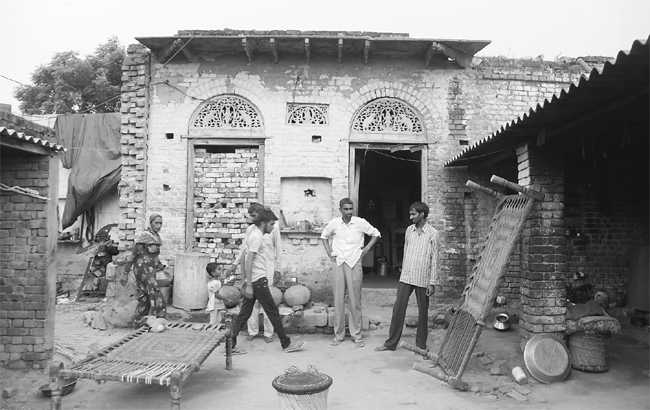
The house of the three brothers at Makdani village in Charkhi Dadri. Bansi Lal Basniwal
Deepender Deswal in Hisar
This is yet another instance of the vicious cycle of debt destroying farmers — this time in Haryana. Eight farmers of Makdani village in Charkhi Dadri district face auction of their agricultural land as they have failed to repay the loans.
Three brothers — Ramdhan (44), Rajender (37) and Sombir (28) — live in a joint family that owns around 9 acres. They received a loan of Rs 90,000 each against their land over the Kisan credit cards in 2006 from the Sarva Haryana Gramin Bank located in neighbouring Maudi village. They say they have not been able to earn as much as to be able to clear their debt.
The outstanding collectively, including interest, has gone up Rs 10.77 lakh. The bank has issued notices to auction their land. The three brothers are also under Rs 10 lakh debt from a private lender.
Bank manager of Sarva Haryana Gramin Bank in Maudi village, Yogender Kumar says he has no option. Auction notices have been decided by the subdivision office (Civil) court in Dadri. He said that the bank has been following the orders of the civil court. Sources said that around 70 farmers of adjoining villages are likely to face similar action.
A visit to the house where the three brothers live revealed their pathetic condition. “We have been putting in 14-18 hours a day in the fields, but have failed to get returns. After taking the loan, we bored a tube-well and had a good produce. We even paid the interest on the loan in 2007,” says Rajender.
Their misfortune started the next season when the tube-well failed. "Since we don't have canal-based irrigation, we have to sow mustard in the rabi season and bajra in kharif season which require less water. We depend on rainwater,” says Rajender.
“Whatever we earn from our land goes towards paying up the interest due to the private lender. We are never in a position to repay the bank loan,” he said. “We are able to meet our bare minimum needs only with the help of the private lender.”
The youngest Sombir says he was able to get five quintals bajra from three acres. “During rabi, I also collected 4.5 quintals mustard. But we have to purchase around 5.5 quintals wheat as an annual quota of grain for the family as wheat crop is not possible in our land,” said Sombir who owns a camel for agricultural work.
The brothers, their 10 children and their women live under one roof and share one kitchen. They own three cows and two buffaloes.
Village sarpanch Mahender Singh says the lack of irrigation facilities was the main reason for the low farm yield and crop failures. "Most of our land doesn't get canal-based water. The groundwater has gone around 100 feet below. That's why tube-wells have not worked,” he said.
Other adjoining villages have similar conditions.
The story of two other brothers, Pawan and Rajesh, is equally poignant. They are required to cough up Rs 10.49 lakh to save around 82-kanal land from auction by the bank.
Deputy commissioner Charkh Dadri, Vijaykumar Sidappa, said the process of auction had been postponed after the civil court stayed the execution till September 25. "I hope that the bank and the farmers would hold a meeting and find a solution,” he said.
Agriculture experts of the Chaudhary Charan Singh Haryana Agriculture University (HAU) say they are not allowed to comment on the current farm crisis.
Inderjit Singh, vice president Haryana Kisan Sabha, says declining returns, higher input costs and exploitation by middlemen and market forces are the key causes behind farmers’ plight.
Dr RS Dalal, secretary of Haryana Kisan Ayog, says setting up agro-industry near farmlands could be a solution. “Though the government is harping on doubling the income of farmer by 2020, there are no steps to encourage farmers. Their produce can get good returns only after value addition. But there is no policy to set up agro industry in the catchment areas.”


























